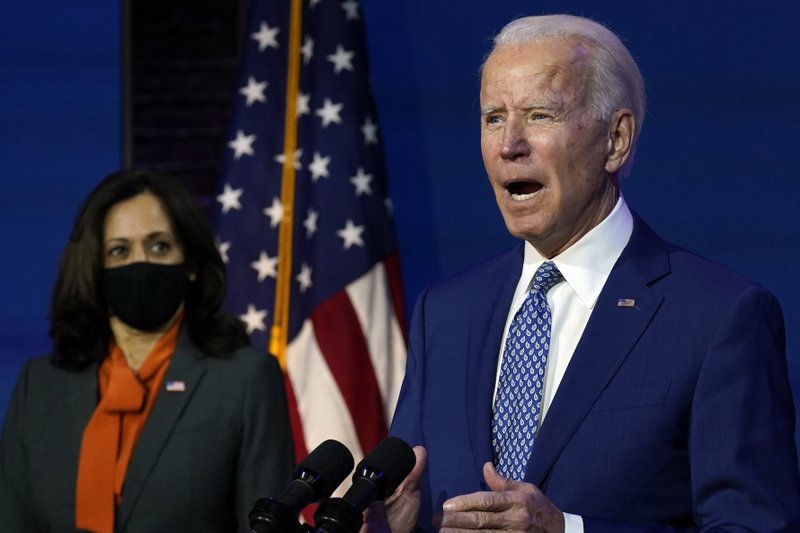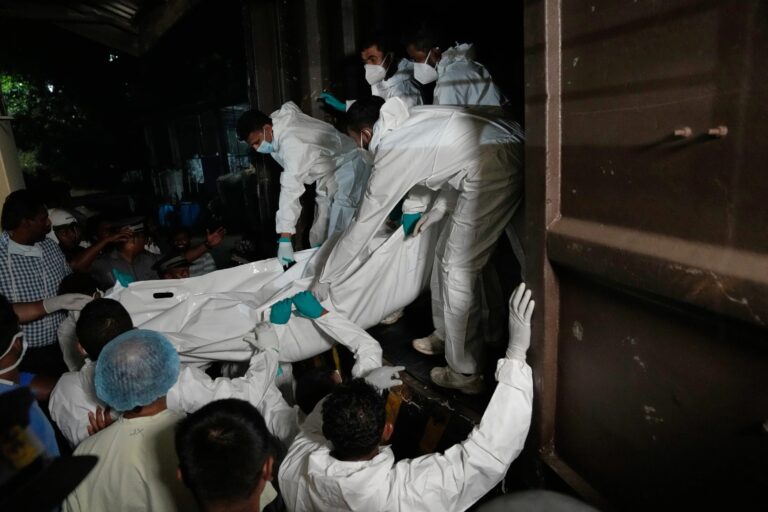President-elect Joe Biden on Monday implored Americans to wear masks to slow the spread of the coronavirus, even as he cheered promising news about the development of an effective vaccine.
Pharmaceutical giant Pfizer announced strong results from a vaccine trial and said it was on track to file an emergency use application with regulators later this month. But Biden warned Americans against complacency, pleading with them to be aggressive in wearing masks and practicing social distance as cases of the virus surge.
The nation passed the sobering total of 10 million infections on Monday, and there have been more than 237,000 deaths from COVID-19.
“We could save tens of thousands of lives if everyone would just wear a mask for the next few months. Not Democratic or Republican lives, American lives,” Biden said. “Please, I implore you, wear a mask.”
Biden’s remarks, delivered after a meeting with his newly formed coronavirus advisory board, represent a shift from President Donald Trump’s relentless upbeat approach to the pandemic. They underscore the emphasis Biden is placing on a virus response, which is likely to dominate the early days of his administration when he assumes the presidency in January.
In a sign of the challenge facing Biden, the pandemic is rapidly intensifying as his presidential transition begins.
Over the past two weeks, the number of confirmed COVID-19 cases has risen nearly 65%. The 7-day rolling average for daily new cases in the U.S. went from 66,294 on Oct. 25 to 108,736.7 on Sunday. In the past week, one of every 433 Americans was diagnosed with COVID-19, and hospitals in several states are running out of space and staff.
Biden is moving forward with creating a coronavirus working group tasked with developing his administration’s pandemic respond. The panel will be led by former Surgeon General Dr. Vivek Murthy, former Food and Drug Administration Commissioner David Kessler and Yale University public health care expert Dr. Marcella Nunez-Smith.
Trump, who has yet to publicly acknowledge Biden’s victory, focused Monday on Pfizer’s announcement and the positive reaction in financial markets.
“STOCK MARKET UP BIG, VACCINE COMING SOON. REPORT 90% EFFECTIVE. SUCH GREAT NEWS!” he tweeted.
An interim analysis of the Pfizer vaccine, from an independent data monitoring board, looked at 94 infections recorded so far in a study that has enrolled nearly 44,000 people in the U.S. and five other countries.
Pfizer says an early look at the data suggests the shots may be 90% effective at preventing COVID-19,.
Trump throughout his campaign said that the nation — even as the infection rate surged to record highs — was rounding the corner on the coronavirus and that a vaccine was imminent. Vice President Mike Pence was holding a meeting of the White House coronavirus task force on Monday.
Pence tweeted that Pfizer’s reported progress was “HUGE NEWS” and suggested it was the result of a “”public-private partnership forged” by Trump. In fact, Pfizer has funded all its own research. It has a contract to sell doses to the U.S. government if a vaccine is approved but has insisted on handling its own shipping.
The White House task force, which includes the federal government’s leading infectious disease expert Dr. Anthony Fauci, has been diminished in recent months as Trump grew impatient with efforts to slow the virus that were having a deleterious impact on the economy.
The advisory board that Biden announced on Monday includes doctors and scientists who have served in previous administrations, many of them experts in public health, vaccines and infectious diseases.
Notable among the members is Rick Bright, a vaccine expert and former head of the Biomedical Advanced Research and Development Authority. He had filed a whistleblower complaint alleging he was reassigned to a lesser job because he resisted political pressure to allow widespread use of hydroxychloroquine, a malaria drug pushed by Trump as a COVID-19 treatment.
Other members include Dr. Luciana Borio, who had senior leadership positions at the FDA and National Security Council during the Obama and Trump administrations; Dr. Ezekiel Emanuel, who served as a special adviser for health policy in the Obama administration; Dr. Atul Gawande, a senior adviser in the Department of Health and Human Services in the Clinton administration and medical writer; and Michael Osterholm, an epidemiologist who served as an adviser to Health and Human Services Secretary Tommy Thompson during the George W. Bush administration.
Public health officials warn that the nation is entering the worst stretch yet for COVID-19 as winter sets in and the holiday season approaches, increasing the risk of rapid transmission as Americans travel, shop and celebrate with loved ones.
“The next two months are going to be rough, difficult ones,” said Dr. Albert Ko, an infectious disease specialist and department chairman at the Yale School of Public Health. “We could see another 100,000 deaths by January.”
Biden pledged during the campaign to make testing free and widely available; to hire thousands of health workers to help implement contact-tracing programs; and to instruct the Centers for Disease Control and Prevention to provide clear, expert-informed guidelines, among other proposals.
There’s hope in the wider medical community that a Biden presidency will help restore U.S. leadership on global public health challenges, including the development and distribution of a vaccine when it becomes available.
Dr. Soumya Swaminathan, the chief scientist of the World Health Organization, said she was more optimistic that a Biden administration would join Covax, a WHO-led project aimed to help deploy vaccines to the neediest people worldwide, whether they live in rich or poor countries.
“Everyone recognizes that for a pandemic, you cannot have a country-by-country approach. You need a global approach,” Swaminathan said.
But in Kansas, one of the states seeing a significant surge in virus cases in recent weeks, at least one hospital official remains skeptical about what a new president can do to turn the tide of the pandemic in the U.S.
“I think the damage is done,” said Kris Mathews, the administrator of Decatur Health, a small hospital in the rural northwest part of the state. “People have made up their minds about how they react to it.”
(AP)












3 Responses
Who in the world thinks he is to implore Americans to do anything. He should start thinking reserving his room in a retirement home, just not in NY State.
I do.
To MIG: You have never answered a question I asked a while ago: Are you paid for your posts?